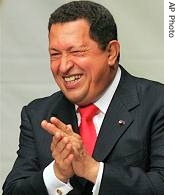-
(单词翻译:双击或拖选)
By David Gollust
Washington
09 January 2007
The U.S. State Department Tuesday expressed skepticism about the industrial
nationalization plans of Venezuelan President Hugo Chavez. The Bush administration has had a difficult relationship with the populist Venezuelan leader. VOA's David Gollust reports from the State Department.

Venezuela's President Hugo Chavez laughs at the swearing ceremony of new ministers in Caracas, 8 Jan 2007
Officials here say decisions about Venezuela's economic future are for the people of that country to make. But they say nationalizations of key industries like those announced by President Chavez have traditionally not provided the economic benefits promised by their promoters.
The comments followed word from Mr. Chavez Monday that he plans to nationalize the country's telecommunications and electric power industries, in which investors1 from the United States and other countries have major interests.
The left-leaning Venezuelan leader revealed the plan as he swore in a new cabinet in Caracas in advance of his own inauguration2 for a new term in office on Wednesday, declaring that Venezuela is heading toward socialism and that no one can prevent it.
The action prompted criticism from the country's business community and sharp drops in the Venezuelan stock market and in the value its currency, the Bolivar. In a talk with reporters, State Department spokesman Sean McCormack said Mr. Chavez has been elected to act on behalf of his country's people but suggested the course he has embarked3 upon may not benefit them:
"The proposals that he's made concerning nationalization are a well-worn path that history has shown doesn't usually benefit the population of the country in question. But those are again, Venezuela's decisions to make," he said. "At this point, if there is a follow through on nationalization, there is an accepted international practice in foreign companies being compensated4 at fair market value for the assets that are nationalized."
McCormack said the United States would expect that Venezuela will follow through on all of its contractual obligations with regard to assets being taken over by the government.
The Bush administration has had a stormy relationship with Mr. Chavez, a close friend of Cuba's ailing5 President Fidel Castro, who won a third term in office in a landslide6 election victory last month.
The Venezuelan president delivered a bitter personal attack on President Bush in a U.N. General Assembly speech in September.
On Monday, Mr. Chavez branded Organization of American States Secretary-General Jose Miguel Insulza as an "idiot" after he expressed concern about a decision by the Chavez government not to renew the operating license7 of a broadcaster, Radio Caracas Television, that had been a persistent8 critic of his rule.
The O.A.S. chief, who has said he will not respond to the Chavez attack, said last week the move against the broadcast outlet9, which was accused of subversion10 by the Venezuelan leader, had no precedent11 in recent years and gave the appearance of an act of censorship.
In his comments here, spokesman McCormack said the Chavez remarks "rather unfortunate" and certainly not conducive12 to building greater understanding and respect in the region.
The State Department last week criticized the move against the the Caracas broadcaster as anti-democratic.
 收听单词发音
收听单词发音
1
investors

|
|
| n.投资者,出资者( investor的名词复数 ) | |
参考例句: |
|
|
|
2
inauguration

|
|
| n.开幕、就职典礼 | |
参考例句: |
|
|
|
3
embarked

|
|
| 乘船( embark的过去式和过去分词 ); 装载; 从事 | |
参考例句: |
|
|
|
4
compensated

|
|
| 补偿,报酬( compensate的过去式和过去分词 ); 给(某人)赔偿(或赔款) | |
参考例句: |
|
|
|
5
ailing

|
|
| v.生病 | |
参考例句: |
|
|
|
6
landslide

|
|
| n.(竞选中)压倒多数的选票;一面倒的胜利 | |
参考例句: |
|
|
|
7
license

|
|
| n.执照,许可证,特许;v.许可,特许 | |
参考例句: |
|
|
|
8
persistent

|
|
| adj.坚持不懈的,执意的;持续的 | |
参考例句: |
|
|
|
9
outlet

|
|
| n.出口/路;销路;批发商店;通风口;发泄 | |
参考例句: |
|
|
|
10
subversion

|
|
| n.颠覆,破坏 | |
参考例句: |
|
|
|
11
precedent

|
|
| n.先例,前例;惯例;adj.在前的,在先的 | |
参考例句: |
|
|
|
12
conducive

|
|
| adj.有益的,有助的 | |
参考例句: |
|
|
|















